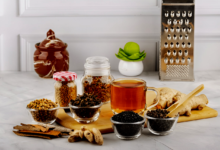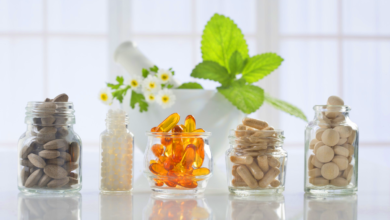The 12 Best Healthiest Low Cholesterol Foods

Elevated levels of cholesterol are regarded as a substantial risk factor for cardiovascular disease. Anemia-related LDL, also referred to as “bad” cholesterol, accumulation in the bloodstream may elevate the likelihood of developing cardiovascular disease through its role in atherosclerosis, the process by which arterial plaque develops.
To reduce your risk of developing cardiovascular disease, you must maintain appropriate cholesterol levels. Fortunately, increasing your consumption of heart-healthy fruits, vegetables, seeds, and legumes, among other dietary modifications, can assist you in attaining and sustaining optimal cholesterol levels.
Read More: 6 Health Benefits Of Omega-3 Fatty Acids
Here are 12 of the best low cholesterol foods.
1. Oats and Oat Bran
Consistent consumption of oats has been shown to substantially reduce risk factors for cardiovascular disease, such as elevated levels of total and LDL cholesterol.
Oats and oat bran are rich in beta-glucan, a soluble fiber that aids in cholesterol reduction by impeding cholesterol absorption in the gastrointestinal tract and promoting cholesterol elimination via bowel movements.
2. Almonds
Incorporating nuts and seeds into a nutritious diet can aid in the reduction of cholesterol levels due to their high soluble fiber content.
Almonds are a popular nut that has been linked to numerous heart health advantages, including lower cholesterol levels. Numerous studies have demonstrated that including almonds in your diet is a simple and efficient method to improve and safeguard your heart health.
A meta-analysis of 19 research published in 2023 discovered that eating nuts, including almonds, is helpful for lowering total cholesterol, LDL cholesterol, and triglyceride levels, which can assist improve heart health. The review also discovered that those who eat nuts on a daily basis have lower levels of small dense LDL particles, which are more strongly connected to the development of atherosclerosis than larger LDL particles.
3. Berries
Berries like blueberries, strawberries, cranberries, raspberries, and blackberries are high in fiber and other heart-healthy nutrients, as well as plant chemicals including anti-inflammatory flavonoid antioxidants.
Berries can help your heart in a variety of ways, including lowering LDL cholesterol, increasing heart-protective HDL cholesterol, and lowering blood pressure.
Berries may help protect against heart disease by reducing inflammation, increasing arterial function, and guarding against cellular damage, in addition to lowering cholesterol levels.
4. Walnuts
Walnuts, like almonds, are a fantastic source of soluble fiber, which can help low cholesterol levels.
A 2023 evaluation of 13 research from the United States, Europe, and Asia discovered that walnut consumption was associated with significant reductions in total cholesterol, LDL cholesterol, and triglyceride levels, particularly in persons who were overweight or obese.
Walnuts contain polyunsaturated fatty acids (PUFA), especially -linoleic acids, which activate LDL receptors and aid in the removal of excess LDL from the circulation.
5. Beans
Beans are among the finest foods for decreasing cholesterol. Beans are high in fiber, which binds to cholesterol and keeps it from being absorbed into the bloodstream. In fact, eating around 34 cup of beans per day may lower LDL cholesterol levels by 19% and heart disease risks by 11%, according to study.
A 2023 study of 73 adults with high LDL cholesterol discovered that consuming one cup of mixed canned beans per day, including black, navy, pinto, dark red kidney, and white kidney beans, for four weeks significantly reduced total cholesterol and LDL cholesterol by 5.46% and 8.08%, respectively. The researchers calculated that lowering LDL cholesterol reduced the risk of heart disease by 7%.
6. Avocados
Avocados have been connected to a number of amazing advantages, including lowering risk factors for heart disease such as high LDL cholesterol and low HDL cholesterol.
According to research, eating avocados on a regular basis may help enhance heart-protective HDL cholesterol and lower levels of oxidized LDL cholesterol, a kind of cholesterol that is strongly linked to atherosclerosis. A moderate-fat diet with one fresh Hass avocado per day for five weeks significantly lowered total cholesterol and LDL cholesterol compared to moderate fat and low-fat diets in a 2023 trial that included 45 men and women with high LDL levels. When compared to the average American diet, the avocado diet considerably reduced blood levels of oxidized LDL.
However, it’s crucial to remember that the Hass Avocado Board supported this study, which could have skewed the findings.
7. Flaxseeds
Flaxseeds are high in elements that promote heart health, such as soluble fiber and magnesium. Including flaxseeds in your diet may help lower total and LDL cholesterol levels, so improving heart health.
A 2023 evaluation of 62 research found that flaxseed supplementation lowered total cholesterol by an average of -5.389 mg/dl and LDL cholesterol by an average of -4.206 mg/dl, perhaps delaying the progression of heart disease.
8. Cocoa Products
Though eating sweets like chocolate candies on a regular basis can be harmful to your heart’s health, including unsweetened cocoa and cacao nibs in your diet may help promote heart health by improving blood lipid levels, lowering inflammation, and supporting healthy blood pressure levels.
According to research, eating cocoa and dark chocolate may help improve heart-protective HDL cholesterol levels while drastically lowering LDL cholesterol. Unsweetened cocoa products have also been demonstrated to increase blood vessel health and blood flow, potentially lowering the risk of heart disease.
9. Chia Seeds
Chia seeds are tiny seeds that are high in nutrients such as fiber and good fats such as PUFAs. Chia seeds are one of the highest fiber sources available. In fact, chia seeds have more fiber than dried fruit, cereals, and nuts.
Chia seeds are a wonderful alternative for people who have high cholesterol because they are high in fiber and other lipid-lowering nutrients like fatty acids. Consuming chia seeds has been shown in studies to help reduce total and LDL cholesterol levels in persons with high blood lipid levels. Furthermore, chia seeds can help raise HDL cholesterol.
10. Okra
Okra is a crop that has a high nutritional value and contains polysaccharides, which are known to have the ability to reduce lipid levels. Additionally, okra is rich in fiber, which has been found in studies to assist in lowering cholesterol levels.
11. Buckwheat
Buckwheat is a gluten-free pseudo-grain that is rich in lipid-lowering elements such as fiber, flavonoids, and bioactive peptides. Buckwheat does not contain gluten in its natural state.
If you want to lower your blood lipid levels, including your total cholesterol and triglyceride levels, choosing buckwheat over refined grain products like white rice and white bread may help you do so. It may also help you improve your nutrient intake, as buckwheat is rich in vitamins and minerals like magnesium and potassium.
12. Seafood
Studies have shown that persons who consume fish on a more regular basis tend to have healthier blood lipid levels. These individuals have greater levels of HDL cholesterol and lower levels of VLDL cholesterol, both of which are associated with a reduced risk of developing cardiovascular disease.
Fish, particularly fatty fish such as sardines, trout, and salmon, is a wonderful source of anti-inflammatory omega-3 fats, which are known to support healthy blood vessel function. Fish is also a fantastic choice for overall health since it contains vitamins and minerals such as zinc, calcium, and selenium.
Foods to Limit
The decisions you make about your nutrition are just one of the numerous things that can play a role in elevating your cholesterol levels. Although the quality of your diet as a whole is the most important factor in determining your heart health, eating less of the foods listed below is a good idea if your blood lipid levels are high:
- foods that have been too processed, such as those that are frozen, packed, or sold in restaurants
- Added sugar, sugary beverages, and sweets such as ice cream, cookies, candies, and cakes are all considered to be unhealthy.
- items that are fried and covered with grease, such as fast food, fried chicken, and french fries.
- Some animal items that are high in fat, such as bacon, sausage, and other fatty types of flesh
- A variety of alcoholic beverages, including beer, wine, and liquor
While reducing these foods will help reduce your blood lipid levels, it’s vital to substitute these things with nutrient-dense foods proven to boost heart health, like vegetables, fruits, beans, nuts, and seeds.
Other Ways to Lower Cholesterol
A healthy lifestyle that incorporates lots of physical activity, quality sleep, and stress management can help promote overall heart health and ideal blood lipid levels. A well-balanced, nutritious diet is just one component of a healthy lifestyle that should be followed.
Keeping a healthy body weight, remaining physically active, getting at least seven hours of sleep every night, limiting one’s consumption of alcoholic beverages, and quitting smoking are all crucial components of cholesterol management.
It is also essential to have an understanding of the phenomenon known as familial hypercholesterolemia, which refers to the hereditary predisposition of certain individuals to have high levels of cholesterol. People who have a genetic condition known as familial hypercholesterolemia have a diminished ability to clear excess LDL from their system and may need medicinal care in order to lower their risk of developing cardiovascular disease. If you have familial hypercholesterolemia, your healthcare professional will advise you on the most appropriate course of therapy based on your individual requirements for maintaining good health.










